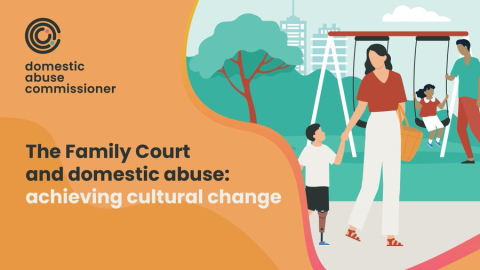An important read for employers to gain a greater understanding of what their employees may be facing when dealing with the family courts. Proceedings can be lengthy, re-traumatising and used as a tool for post-separation abuse. Greater awareness will help employers to shape their response, including providing appropriate time off to deal with court proceedings and signposting their people to external expert support.
A report released today by the Domestic Abuse Commissioner reveals just how much work still needs to be done to reform the family court system to make it supportive of domestic abuse victims and their children. The report, The Family Court and domestic abuse: achieving cultural change, presents the key issues that child and adult victims and survivors face when they encounter the court, and describes how these failings enable the court to become a tool of post-separation coercive control. It highlights a lack of understanding and minimisation of domestic abuse, which causes re-traumatisation. Additionally, the report raises concerns about the absence of the child’s voice in the proceedings, and how children are put at risk through unsafe contact orders. It calls for greater transparency and for fundamental change.
The key issues
Much of this is not new. Two years ago, the Ministry of Justice’s Harm Panel report was damning in its findings, unveiling ‘deep-seated and systematic issues’ that put children and adult domestic abuse victims at risk in the family court system. That report also highlighted the ways that family courts fail to safeguard people when they are at their most vulnerable, condemning victims to continued abuse and trauma, with an assumption that a parent’s involvement in a child’s life is beneficial, regardless of the risks posed by abuse. The Domestic Abuse Commissioner highlights evidence suggesting that 60% of cases that go through the family court system involve domestic abuse.
There remains a culture of disbelief for survivors raising issues of domestic abuse, and narratives of ‘parental alienation’ persist. A pro-contact culture means that children are often forced to have contact with an abusive parent, sometimes against their will. According to the Harm Panel, under-resourcing, siloed working, a lack of specialist court support and the inappropriate use of mediation means that survivors and their children risk being retraumatised repeatedly.
Progress is too slow
The victims and survivors of domestic abuse point out that while two years have passed since the Harm Panel findings, little has changed. The Domestic Abuse Commissioner has nonetheless today noted some key areas of progress, such as: the prohibition of cross-examination by a defendant within all family law proceedings; the establishment of the Qualified Legal Representative (QLR) scheme; and the fact that Independent Domestic Violence Advocates (IDVAs) and Independent Sexual Violence Advocates (ISVAs) have been given access to the court to provide crucial support.
Charlotte Budd, a survivor who has been campaigning to bring justice to the family court system, says it is vital to raise awareness and bring about further change. In her case, her abuser had a problem with substance abuse, had already been arrested for physically assaulting her, and had threatened to kill her, but it made no difference to his right to access his child.
“I was so naïve that I honestly believed that with his history of drug addiction and with the police involvement, the courts would give him very little or no contact with my daughter,” she says. Instead, she went through a nightmare that lasted two and a half years and continues to this day as her abuser still retains rights to see his child.
Lack of knowledge in the courts
Budd had kept a journal and recorded evidence of her abuse. She was horrified by what happened when she entered the family court system. The magistrates involved in her case had little to no education about domestic abuse, and because Budd’s abuser had maintained his post separation abuse - cutting her off from any financial support - she had very few resources to rely on. At the time, she did not have access to Legal Aid, and had to represent herself. In contrast, her abuser had a barrister to represent him.
“I was treated like an inconvenience. They didn’t have any knowledge of domestic abuse or trauma. They didn’t even do a drugs test, and they ignored all the evidence that I had; witnesses and recorded evidence. They told me that if it was that bad, I would have reported him to the police more often. The victim blaming was awful,” she says.
She describes being like a ‘deer in headlights’ as she was forced to confront her own abuser in court. “I didn’t have a clue, and I was taken advantage of at every step. I assumed someone would tell me what my rights were. I remember saying, ‘I don’t know what questions to ask, could someone please help me?’. They would just ‘tut tut’ at me and say, ‘can you speak louder, we can’t hear you’.”
Bringing about reform
Today’s findings follow on from a previous November 2021 report by the Domestic Abuse Commissioner, which also emphasised the need for more specialist training to be embedded throughout the family justice system to ensure there is a full understanding of the nature of domestic abuse and its impact on survivors and children. Another very important change would be to ensure that all survivors have access to non-means-tested legal aid.
Today’s report sets out a planned pilot for a Monitoring and Reporting Mechanism for the family court, which was recommended by the Harm Panel, to be established in the Office of the Domestic Abuse Commissioner in partnership with the Victims’ Commissioner. The new mechanism will overview and report regularly on the family court’s performance. It will monitor compliance with existing and new rules and guidance, and seek to assess regional variance in performance.
In her own campaigning, Budd also points out where vital change is needed. Legal training for magistrates is essential. Currently, magistrates only attend a three-day training course, and have very little understanding of domestic abuse. Moreover, there is a lack of transparency around judicial decision-making. Unregulated experts are allowed to testify on behalf of perpetrators of abuse. If 60% of cases that go through the court system involve domestic abuse, the reality is, only 1% of cases end in no contest or indirect contact, she says.
“One of the things that I wish I had done at the beginning was to get support from a women’s or domestic abuse charity to help me through the process. Most people think that family courts are protective of victims and their children but even now, that is the furthest thing from the truth. Family courts are knowingly handing children over to abusive parents,” she says.

